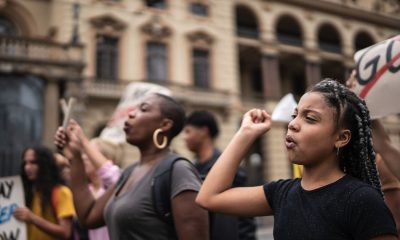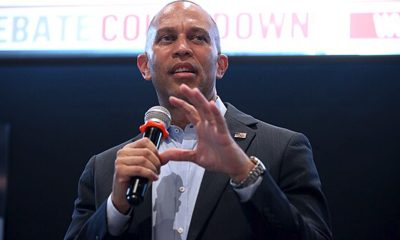Community
Be Better Foundation honors victims of gun violence
MINNESOTA SPOKESMAN-RECORDER —
By Dwight Hobbes
“Often, we think, ‘That kind of thing doesn’t happen to me.’ But nothing precludes us from being a victim of violence,” said Minnesota State Senator Jeff Hayden, whose 25-year-old sister was killed in a crossfire July 23, 2016 between rival street gangs.
Having already established the Taylor Hayden Memorial Foundation to End Gun Violence in her honor, Hayden was present Dec. 22 at the launch of the Tarvanisha B. Boyd “Be Better” Foundation at Sabathani Community Center in Minneapolis in honor of another victim of gun violence.
Veteran activist Al Flowers created the “Be Better” Foundation in honor of his own tragic loss — the shooting death of his 24-year-old daughter Tarvanisha Boyd on Dec. 20, 2014 during an argument in her Georgia home.
“This is always a tough time for [the family] from the 20th, when we lost Tarvy, to the 31st, which was her birthday,” said Flowers.
He told the MSR, “I don’t want her [passing] to be in vain. Anybody who dies with gun violence should always be recognized, and I want to use this as an opportunity. Our family has a lot of pain, but we can lift that hurt for others who are in the pain.”
“I want to give my condolences to the Flowers family because I know exactly how it feels,” said Hayden.
Boyd’s brother, Al Flowers, Jr., has taken the personal tragedy as inspiration to work for well being in the community.
“Little Man, as we call him, is dedicated to everybody who has lost their lives to gun violence so nobody will ever be forgotten,” said Flowers. “I’m thankful for what he’s involved with and what he’s going to accomplish.”
Flowers, Jr. said, “[Tarvanisha] told me, ‘Be better. Just be better in everything you do, no matter what. Always try to be better.’ She was right.
“We do need to be better — better fathers, teachers, doctors, better community members [and] better people just in general,” said Flowers, Jr. “It’s on us. We have to stand up. Every single day.”
He added, “You can’t save the whole world, but you can help the next person change. It could be just your friend, your child. It’s not an overnight fight. It’s going to happen over time. This is not just a memorial; it’s the start of something strong.”
Hayden commended the family for their activism efforts.
“One of the things the Flowers family has supported me in is a bill named after my sister that figures out how we can get the resources so we can get our young people to understand what happens when you pull that trigger. How everybody’s lives change, your life, your family’s life.
“Your victim’s life really changes, and their family changes,” Hayden told the crowd. “I’m thankful for their tireless work on this issue.”
He also challenged the community to take a universal stand against all violence. “If this was a case of police shooting someone, the place would be packed, the media would be here,” said Hayden. “When it’s us who kills us, somehow that doesn’t rise to the level of us caring about us.
“I care about us,” Hayden said. “When I think about what we need to do, there’s a saying we have: ‘Let’s get upstream.’ Let’s talk about prevention. You know where prevention starts, family? Right here.”
Sabathani’s president, Cindy Booker, who donated space for the event, said, “Al Flowers has done a great deal for the community in a lot of various ways, and it was a tragedy what happened to his family.” Booker said she had also suffered a violent death in her family.
“My father was murdered too, so, I understand what a family goes through,” she said. “It was just an honor for us to give back to the community by providing this space, and for the community to come out and give back to the Al Flowers family and for [that] family to continue to give to the community.”
Booker added, “I hope to make this an annual event. I want people to know [a death] is not always the end. Sometimes it’s the beginning.”
Hayden echoed those sentiments during his remarks. Looking around at the children sitting on laps and at the tables, he said, “It’s so wonderful to see these babies because that’s where it starts. We are all that we’ve got. If we’re going to be saved, it’s time for us to spend some equity on ourselves.”
Patunya Cofield, Tarvanisha’s mother, steeled her emotions to close out the program. “Tarvanisha meant so much to so many people,” she said, surrounded for moral support by Tarvanisha’s sisters, Shyanna Cotton and Destiny Cofield, and her brother Flowers, Jr.
“She was the first person who taught me to love the rest of [my children]. How could you not love a child who made it her business to make sure you knew she loved you? In everything she did.”
She underscored the heart of this gathering: “[Gun violence] don’t affect you until it hits your family.”
This article originally appeared in the Minnesota Spokesman-Recorder.
Activism
Oakland Post: Week of December 31, 2025 – January 6, 2026
The printed Weekly Edition of the Oakland Post: Week of – December 31, 2025 – January 6, 2026

To enlarge your view of this issue, use the slider, magnifying glass icon or full page icon in the lower right corner of the browser window.
Activism
Big God Ministry Gives Away Toys in Marin City
Pastor Hall also gave a message of encouragement to the crowd, thanking Jesus for the “best year of their lives.” He asked each of the children what they wanted to be when they grow up.

By Godfrey Lee
Big God Ministries, pastored by David Hall, gave toys to the children in Marin City on Monday, Dec. 15, on the lawn near the corner of Drake Avenue and Donahue Street.
Pastor Hall also gave a message of encouragement to the crowd, thanking Jesus for the “best year of their lives.” He asked each of the children what they wanted to be when they grew up.
Around 75 parents and children were there to receive the presents, which consisted mainly of Gideon Bibles, Cat in the Hat pillows, Barbie dolls, Tonka trucks, and Lego building sets.
A half dozen volunteers from the Big God Ministry, including Donnie Roary, helped to set up the tables for the toy giveaway. The worship music was sung by Ruby Friedman, Keri Carpenter, and Jake Monaghan, who also played the accordion.
Big God Ministries meets on Sundays at 10 a.m. at the Mill Valley Community Center, 180 Camino Alto, Mill Valley, CA Their phone number is (415) 797-2567.
Activism
First 5 Alameda County Distributes Over $8 Million in First Wave of Critical Relief Funds for Historically Underpaid Caregivers
“Family, Friend, and Neighbor caregivers are lifelines for so many children and families in Alameda County,” said Kristin Spanos, CEO, First 5 Alameda County. “Yet, they often go unrecognized and undercompensated for their labor and ability to give individualized, culturally connected care. At First 5, we support the conditions that allow families to thrive, and getting this money into the hands of these caregivers and families at a time of heightened financial stress for parents is part of that commitment.”

Family, Friend, and Neighbor Caregivers Can Now Opt Into $4,000 Grants to Help Bolster Economic Stability and Strengthen Early Learning Experiences
By Post Staff
Today, First 5 Alameda County announced the distribution of $4,000 relief grants to more than 2,000 Family, Friend, and Neighbor (FFN) caregivers, totaling over $8 million in the first round of funding. Over the full course of the funding initiative, First 5 Alameda County anticipates supporting over 3,000 FFN caregivers, who collectively care for an estimated 5,200 children across Alameda County. These grants are only a portion of the estimated $190 million being invested into expanding our early childcare system through direct caregiver relief to upcoming facilities, shelter, and long-term sustainability investments for providers fromMeasure C in its first year. This investment builds on the early rollout of Measure C and reflects a comprehensive, system-wide strategy to strengthen Alameda County’s early childhood ecosystem so families can rely on sustainable, accessible care,
These important caregivers provide child care in Alameda County to their relatives, friends, and neighbors. While public benefits continue to decrease for families, and inflation and the cost of living continue to rise, these grants provide direct economic support for FFN caregivers, whose wages have historically been very low or nonexistent, and very few of whom receive benefits. As families continue to face growing financial pressures, especially during the winter and holiday season, these grants will help these caregivers with living expenses such as rent, utilities, supplies, and food.
“Family, Friend, and Neighbor caregivers are lifelines for so many children and families in Alameda County,” said Kristin Spanos, CEO, First 5 Alameda County. “Yet, they often go unrecognized and undercompensated for their labor and ability to give individualized, culturally connected care. At First 5, we support the conditions that allow families to thrive, and getting this money into the hands of these caregivers and families at a time of heightened financial stress for parents is part of that commitment.”
The funding for these relief grants comes from Measure C, a local voter-approved sales tax in Alameda County that invests in young children, their families, communities, providers, and caregivers. Within the first year of First 5’s 5-Year Plan for Measure C, in addition to the relief grants to informal FFN caregivers, other significant investments will benefit licensed child care providers. These investments include over $40 million in Early Care and Education (ECE) Emergency Grants, which have already flowed to nearly 800 center-based and family child care providers. As part of First 5’s 5-Year Plan, preparations are also underway to distribute facilities grants early next year for child care providers who need to make urgent repairs or improvements, and to launch the Emergency Revolving Fund in Spring 2026 to support licensed child care providers in Alameda County who are at risk of closure.
The FFN Relief Grants recognize and support the essential work that an estimated 3,000 FFN caregivers provide to 5,200 children in Alameda County. There is still an opportunity to receive funds for FFN caregivers who have not yet received them.
In partnership with First 5 Alameda County, Child Care Payment Agencies play a critical role in identifying eligible caregivers and leading coordinated outreach efforts to ensure FFN caregivers are informed of and able to access these relief funds.FFN caregivers are eligible for the grant if they receive a child care payment from an Alameda County Child Care Payment Agency, 4Cs of Alameda County, BANANAS, Hively, and Davis Street, and are currently caring for a child 12 years old or younger in Alameda County. Additionally, FFN caregivers who provided care for a child 12 years or younger at any time since April 1, 2025, but are no longer doing so, are also eligible for the funds. Eligible caregivers are being contacted by their Child Care Payment Agency on a rolling basis, beginning with those who provided care between April and July 2025.
“This money is coming to me at a critical time of heightened economic strain,” said Jill Morton, a caregiver in Oakland, California. “Since I am a non-licensed childcare provider, I didn’t think I was eligible for this financial support. I was relieved that this money can help pay my rent, purchase learning materials for the children as well as enhance childcare, buy groceries and take care of grandchildren.”
Eligible FFN caregivers who provided care at any time between April 1, 2025 and July 31, 2025, who haven’t yet opted into the process, are encouraged to check their mail and email for an eligibility letter. Those who have cared for a child after this period should expect to receive communications from their child care payment agency in the coming months. FFN caregivers with questions may also contact the agency they work with to receive child care payments, or the First 5 Alameda help desk, Monday through Friday, from 9 a.m. to 5:00 p.m. PST, at 510-227-6964. The help desk will be closed 12/25/25 – 1/1/26. Additional grant payments will be made on a rolling basis as opt-ins are received by the four child care payment agencies in Alameda County.
Beginning in the second year of Measure C implementation, FFN caregivers who care for a child from birth to age five and receive an Alameda County subsidized voucher will get an additional $500 per month. This amounts to an annual increase of about $6,000 per child receiving a subsidy. Together with more Measure C funding expected to flow back into the community as part of First 5’s 5-Year Plan, investments will continue to become available in the coming year for addressing the needs of childcare providers in Alameda County.
About First 5 Alameda County
First 5 Alameda County builds the local childhood systems and supports needed to ensure our county’s youngest children are safe, healthy, and ready to succeed in school and life.
Our Mission
In partnership with the community, we support a county-wide continuous prevention and early intervention system that promotes optimal health and development, narrows disparities, and improves the lives of children from birth to age five and their families.
Our Vision
Every child in Alameda County will have optimal health, development, and well-being to reach their greatest potential.
Learn more at www.first5alameda.org.
-

 Bay Area3 weeks ago
Bay Area3 weeks agoPost Salon to Discuss Proposal to Bring Costco to Oakland Community meeting to be held at City Hall, Thursday, Dec. 18
-

 Activism3 weeks ago
Activism3 weeks agoMayor Lee, City Leaders Announce $334 Million Bond Sale for Affordable Housing, Roads, Park Renovations, Libraries and Senior Centers
-

 Activism3 weeks ago
Activism3 weeks agoOakland Post: Week of December 10 – 16, 2025
-

 Activism3 weeks ago
Activism3 weeks agoOakland School Board Grapples with Potential $100 Million Shortfall Next Year
-

 Arts and Culture3 weeks ago
Arts and Culture3 weeks agoFayeth Gardens Holds 3rd Annual Kwanzaa Celebration at Hayward City Hall on Dec. 28
-

 Activism3 weeks ago
Activism3 weeks ago2025 in Review: Seven Questions for Black Women’s Think Tank Founder Kellie Todd Griffin
-

 Advice3 weeks ago
Advice3 weeks agoCOMMENTARY: If You Don’t Want Your ‘Black Card’ Revoked, Watch What You Bring to Holiday Dinners
-

 Activism3 weeks ago
Activism3 weeks agoAnn Lowe: The Quiet Genius of American Couture























































